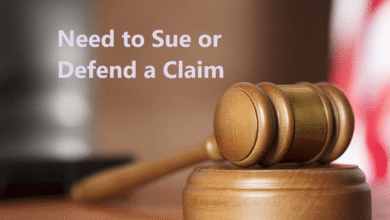How to Legally Protect Your Small Business in the U.S.
Legally protect your small business in the U.S. with LLCs, contracts, trademarks & compliance. Avoid lawsuits and secure your assets today.

Legally protecting your small business is one of the most critical steps to ensuring its long-term success and stability. Without proper safeguards, entrepreneurs risk financial loss, lawsuits, and even the forced closure of their businesses. From choosing the right legal structure to securing intellectual property and drafting enforceable contracts, every decision plays a vital role in minimizing risk. Whether you’re just starting or looking to strengthen your existing business, understanding these legal protections will help you navigate challenges with confidence.
Operating a small business in the U.S. comes with a complex web of federal, state, and local regulations. Failure to comply with employment laws, tax requirements, or industry-specific rules can lead to costly penalties. By proactively implementing legal protections such as forming an LLC, obtaining the right insurance, and maintaining accurate records you can shield your business from unexpected threats. This guide will walk you through the essential steps to legally protect your small business, giving you peace of mind as you grow and scale your venture.
How to Legally Protect Your Small Business in the U.S.
Choose the Right Business Structure
Register Your Business and Obtain Licenses
Properly registering your business and securing the necessary licenses and permits is fundamental to operating legally and avoiding penalties. Start by choosing and registering your business name with your state—either as a legal entity (like an LLC or corporation) or as a Doing Business As (DBA) if using a trade name. Obtain an Employer Identification Number (EIN) from the IRS for tax purposes, banking, and hiring employees. Research federal, state, and local business license requirements, which vary by industry and location—common examples include general business licenses, health permits, and professional certifications.
Protect Your Intellectual Property
Safeguarding your intellectual property (IP) is crucial for maintaining your competitive edge and brand identity. Start by trademarking your business name, logo, and slogans through the U.S. Patent and Trademark Office (USPTO) to prevent others from using similar branding. For original creative works like websites, marketing materials, or software code, file for copyright protection, which automatically applies upon creation but is strengthened by official registration. If you’ve developed a unique product, process, or invention, explore patent protection to secure exclusive rights consult a patent attorney to navigate this complex process.
Comply with Employment Laws
Adhering to employment laws is non-negotiable for protecting your small business from costly lawsuits and penalties. Start by properly classifying workers as either employees or independent contractors, as misclassification can trigger IRS audits and legal action. Follow the Fair Labor Standards Act (FLSA) for minimum wage, overtime pay, and child labor standards, and ensure your payroll practices align with state-specific regulations. Implement anti-discrimination policies in line with EEOC guidelines, covering hiring, promotions, and workplace conduct to prevent violations of Title VII, ADA, and other federal protections.
Draft Strong Contracts and Agreements
Well-crafted contracts and agreements form the legal backbone of your small business, protecting you from disputes and liabilities. Start by creating clear, detailed contracts for clients that outline deliverables, payment terms, timelines, and dispute resolution procedures this prevents misunderstandings that could lead to non-payment or legal battles. Use Non-disclosure agreements (NDAs) to safeguard proprietary information when discussing business with partners, employees, or vendors. For hiring, implement employment agreements that define job responsibilities, compensation, confidentiality clauses, and termination conditions.
Secure Business Insurance
Protecting your small business with the right insurance coverage is a critical safeguard against unexpected financial losses. Start with general liability insurance, which covers third-party injuries, property damage, and advertising claims essential for virtually every business. Depending on your industry, consider professional liability insurance (for service-based businesses facing negligence claims) or product liability insurance (for manufacturers and retailers). If you have employees, workers’ compensation insurance is legally required in most states and covers workplace injuries. For businesses handling sensitive data, cyber liability insurance can mitigate costs from breaches or ransomware attacks.
Keep Accurate Financial Records
Separate Business & Personal Finances
Maintain dedicated business bank accounts and credit cards to simplify accounting and avoid legal complications. This separation is crucial for tax purposes and liability protection, especially for LLCs and corporations.
Implement Reliable Tracking Systems
Use accounting software like QuickBooks or Xero to automate expense tracking, invoicing, and payroll. Schedule monthly reconciliations to catch discrepancies early and maintain audit-ready records.
Retain Documents Strategically
Store tax filings, receipts, and contracts for 3-7 years (varies by document type). Digitize records with cloud backups to ensure accessibility during audits, lawsuits, or financing applications.
Plan for Dispute Resolution
Include Clear Contract Clauses
Draft agreements with mandatory mediation/arbitration clauses to avoid costly litigation. Specify governing law, venue, and steps for resolution in all client/vendor contracts to prevent ambiguity.
Know Your Legal Options
For minor disputes under $10,000, use small claims court for fast resolutions. For complex cases, retain a business litigation attorney early to assess strengths/weaknesses before conflicts escalate.
Document Everything Proactively
Maintain detailed records of communications, contracts, and transactions. Use timestamped emails and signed acknowledgments as evidence if disputes arise over payments, deliverables, or partnerships.
Stay Updated on Legal Changes
Follow Regulatory Updates
Laws affecting small businesses change frequently. Subscribe to newsletters from the SBA, IRS, and DOL for real-time updates on tax, employment, and industry-specific regulations that impact your operations.
Consult Legal
Schedule annual reviews with a business attorney and accountant to ensure compliance. They can alert you to new laws like data privacy rules, minimum wage increases, or licensing requirements before they affect your business.
Leverage Technology
Use legal compliance software like ComplyRight or set up Google Alerts for keywords like “small business law updates [your state].” Join local chambers of commerce for workshops on regulatory changes.
Read More: The Legal Side of Starting a Healthcare Practice in Florida
Conclusion
Legally protecting your small business is not just a one-time task, but an ongoing commitment that safeguards your hard work and investments. By implementing the right business structure, securing proper insurance, and staying compliant with regulations, you create a strong foundation that minimizes risks and allows your business to thrive. Taking these proactive steps ensures you’re prepared for potential legal challenges while maintaining your focus on growth and success.
Ultimately, the effort you put into legally protecting your small business today can prevent costly disputes and liabilities tomorrow. Whether it’s through contracts, intellectual property protection, or sound financial practices, each layer of security contributes to long-term stability. Consulting with legal and financial professionals can further strengthen your position, giving you the confidence to navigate the complexities of business ownership while keeping your enterprise secure and compliant.
FAQs
What is the best business structure for liability protection?
An LLC or corporation offers the best personal liability protection for small business owners.
Do I need a trademark for my business name?
Yes, a trademark prevents others from using your brand name or logo without permission.
What type of insurance does a small business need?
At minimum, consider general liability, professional liability, and workers’ compensation insurance.
How can I protect my business from lawsuits?
Use strong contracts, maintain compliance, and secure proper business insurance to reduce legal risks.
Do I need a lawyer to start a small business?
While not mandatory, consulting a business attorney ensures legal compliance and proper documentation.











